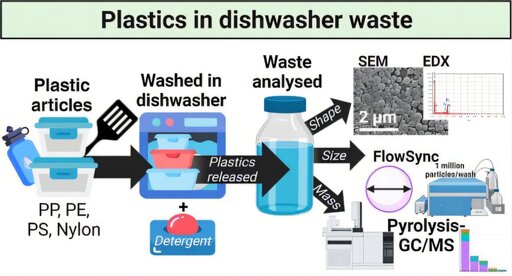The overall plastic mass equated to about 6 milligrams per person per year, or about a quarter of the weight of a grain of rice
Multiply by nr of persons and years…
Yes, that is what “per person per year” means
Contaminating what? My septic tank that gets emptied every 10 years?
Where do you think the truck that empties your tank goes?
No clue. Guess thats what im asking.
They haul it and dispose of it in the sewer.
It goes with the water that leaves your septic tank.
A septic tank is only meant to separate the water from oils and sludge.
Really? So all my piss goes right thru and into my yard? If it filters out and stores solids wouldn’t it also catch the microplastics too?
Depends on where you live. Mine goes trough the septic tank towards the sewer. A lot of houses also just go directly to the sewers.
And no, many microplastics are too lightweight to settle with the solids.
Betcha scrubbing them in the sink does too. It’s just harder to set up a controlled study.
My dish sponge is plastic.¯_(ツ)_/¯
Yeah I wish they would have done that. Would be interesting to see. Hand washed plastic containers are subjected to much more mechanical scrubbing action, but much less heat.
Dishwashers usually wash hotter than you do in the sink & reuse the water, so I’d imagine they also produce more microplastic in the process.
Hotter yes, but no plastic-on-plastic scrubbing. And not reusing the water wouldn’t change the amount of plastic, it would just be diluted in a larger amount of water. My guess would be, larger particles. But I can see why that would have to be its own, more complicated study. Because so many more variables.
Do you know that water with microplastics doesn’t cause even more microplastics? Seems reasonable to me - the existing microplastic should be ground even finer, and also cause more microplastic to be ground off.
Interesting thought, we’ll have to include it in our study. I posit that the microparticles from hand washing will be larger anyway, because method, and will include plastic from the scrubber as well as the containers.
There’s a good chance! Really depends on the impact of temperature, though since we’re still waaaaay below the melting point of plastic, intuitively I’d agree with you.
So where do we get our funding? I’m thinking about a billion, if we call it The Big Beautiful Golden Study, sponsored by plastic and dishwasher manufacturers.
No no no, you have to think about it differently. Neither of those industries will want to sponsor something like this. Instead we have to go with their natural enemies - and was is the opposite of plastic (i.e. what is non-plastic)? Obviously concrete!
And people are grossed out when they learn that people can have enough micro/nanoplastic in their brain to make a disposable plastic spoon (2g). :)
It’s up to a credit card now (9g)
The methodology used to get that result is supposedly very questionable.
I heard it here:
Science Vs: Is There Really a Plastic Spoon in Our Brains?
Not to minimize the impact of microplastics, but the credit card amount is probably way off.
When i die i want my brain plastic to be used for a warhammer figurine!
the microsplastic keep my brain smooth and flexible :3
This made me chuckle
Neuroplasticity
Plastic is poison.
Basically any situation where plastic is warmed is a source of microplastic contamination
Probably mechanical abrasion too. Like car tires. Or your carpets/rug. Or your toothbrush. Or your nylon/sport/athlesure wear. Or soft, non-natural blankets, haha. I bet your furniture, too…
wool carpets for the win.
And yet somehow it lasts forever in a landfill.
We can’t win.
Just wash your dishes in a landfill.
Basically any situation where plastic is ,
warmedis a source of microplastic contamination
Well I don’t want my Vitamin P to be covered in bacteria.









